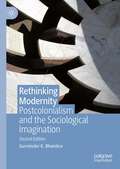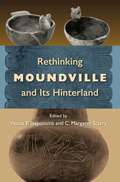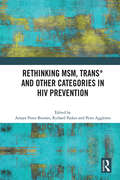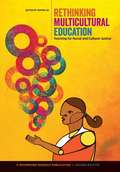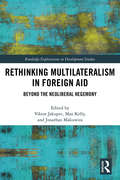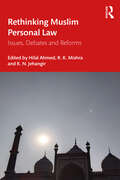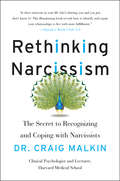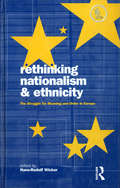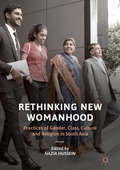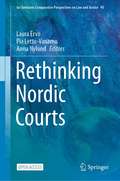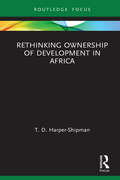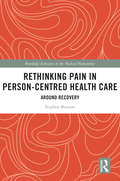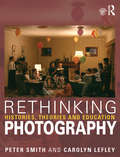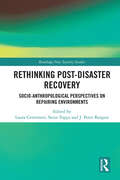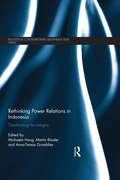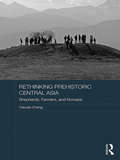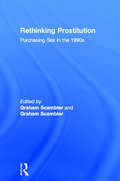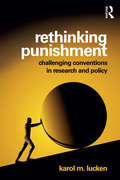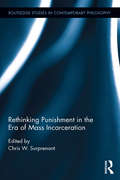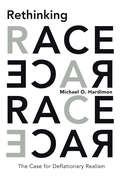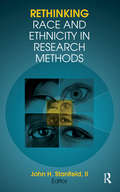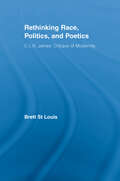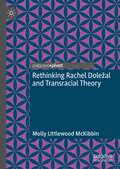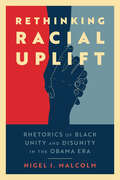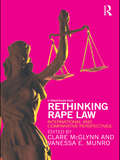- Table View
- List View
Rethinking Modernity: Postcolonialism and the Sociological Imagination
by Gurminder K. BhambraThe second edition of this influential book addresses how the experiences and claims of non-European ‘others’ have been rendered invisible to the standard narratives and analytical frameworks of sociological understandings of modernity. In challenging the dominant, Euro-centred accounts of the emergence and development of modernity, Bhambra puts forward an argument for ‘connected histories’ in the reconstruction of historical sociology at a global level. This updated version of the original, published in 2007, adds a new preface which explores key themes that Bhambra has further developed over the intervening years: specifically, how the rethinking of modernity enables us to reconstruct sociology and a call for a 'reparatory sociology' committed to the repair of the social sciences and the securing of global justice.
Rethinking Moundville and Its Hinterland (Florida Museum of Natural History: Ripley P. Bullen Series)
by Vincas P. Steponaitis C. Margaret ScarryMoundville, near Tuscaloosa, Alabama, is one of the largest pre-Columbian mound sites in North America. Comprising twenty-nine earthen mounds that were once platforms for chiefly residences and public buildings, Moundville was a major political and religious center for the people living in its region and for the wider Mississippian world. A much-needed synthesis of the rapidly expanding archaeological work that has taken place in the region over the past two decades, this volume presents the results of multifaceted research and new excavations. Using models deeply rooted in local ethnohistory, it ties Moundville and its people more closely than before to the ethnography of native southerners and emphasizes the role of social memory, iconography, and ritual practices both at the mound center and in the rural hinterland, providing an up-to-date and refreshingly nuanced interpretation of Mississippian culture. A volume in the Florida Museum of Natural History: Ripley P. Bullen Series
Rethinking MSM, Trans* and other Categories in HIV Prevention
by Amaya Perez-Brumer Richard Parker Peter AggletonAs the HIV epidemic moves into its fourth decade, it is clear that the global response has failed to adequately address the needs of a wide range of vulnerable populations and groups. Chief among these are gay, bisexual and other men who have sex with men, and transgender persons, who globally face the disproportional burden of HIV infection. This volume rethinks HIV prevention and health promotion for sexual and gender minorities – in both the industrialised societies of the West, as well as in the developing nations of the Global South. The chapters it contains offer a critical analysis of past and present HIV research employing categories to designate gay and other men who have sex with men, transgender persons, and/or other persons and communities with diverse gender and sexual identities. Contributors question the politics of many of the existing classifications and categories in HIV research and argue for a more sophisticated analysis of gender and sexual diversity in order to tackle the social and political barriers that impede the design of successful HIV prevention and health promotion approaches. This book was originally published as a special issue of Global Public Health.
Rethinking Multicultural Education: Teaching for Racial and Cultural Justice
by Wayne Au<P>All writing is a collective process, and none more so than with Rethinking Schools. <P>This book would have not been possible without the collective efforts of many people.
Rethinking Multilateralism in Foreign Aid: Beyond the Neoliberal Hegemony (Routledge Explorations in Development Studies)
by Viktor Jakupec Max Kelly Jonathan MakuwiraThis edited book provides a contemporary, critical and thought-provoking analysis of the internal and external threats to Western multilateral development finance in the twenty-first century. It draws on the expertise of scholars with a range of backgrounds providing a critical exploration of the neoliberal multilateral development aid. The contributions focus on how Western institutions have historically dominated development aid, and juxtapose this hegemony with the recent challenges from right-wing populist and the Beijing Consensus ideologies and practices. This book argues that the rise of right-wing populism has brought internal challenges to traditional powers within the multilateral development system. External challenges arise from the influence of China and regional development banks by providing alternatives to established Western dominated aid sources and architecture. From this vantagepoint, Rethinking Multilateralism in Foreign Aid puts forward new ideas for addressing the current global social, political and economic challenges concerning multilateral development aid. This book will be of interest to researchers, academics and students in the field of International Development and Global Governance, decision-makers at government level as well as to those working in international aid institutions, regional and bilateral aid agencies, and non-governmental organisations.
Rethinking Muslim Personal Law: Issues, Debates and Reforms
by R. K. Mishra K. N. Jehangir Hilal AhmedThis volume critically analyses Muslim Personal Law (MPL) in India and offers an alternative perspective to look at MPL and the Uniform Civil Code (UCC) debate. Tracing the historical origins of this legal mechanism and its subsequent political manifestations, it highlights the complex nature of MPL as a sociological phenomenon, driven by context-specific social norms and cultural values. With expert contributions, it discusses wide-ranging themes and issues including MPL reforms and human rights; decoding of UCC in India; the contentious Triple Talaq bill and MPL; the Shah Bano case; Sharia (Islamic jurisprudence) in postcolonial India; women’s equality and family laws; and MPL in the media discourse in India. The volume highlights that although MPL is inextricably linked to Sharia, it does not necessarily determine the everyday customs and local practices of Muslim communities in India This topical book will greatly interest scholars and researchers of law and jurisprudence, political studies, Islamic studies, Muslim Personal Law, history, multiculturalism, South Asian studies, sociology of religion, sociology of law and family law. It will also be useful to practitioners, policymakers, law professionals and journalists.
Rethinking Narcissism: The Bad---and Surprising Good---About Feeling Special
by Craig MalkinAre you a narcissist?"What is narcissism?" is one of the fastest-rising searches on Google, and articles on the topic routinely go viral. Yet the word "narcissism" seems to mean something different each time it's uttered. <P><P>In fact, the more it's slung about, the more elusive its true meaning becomes. The only certainty, it would seem, is that it's "bad" to be a narcissist--really bad. That's terrible news for millennials, who've been branded "the most narcissistic generation ever." <P>In Rethinking Narcissism, Dr. Craig Malkin--a Harvard Medical School Instructor and clinical psychologist with more than two decades of clinical experience--offers a radically new model for understanding this often misused term. <P>Narcissism, argues Dr. Malkin, is essentially a spectrum of self-importance--and everyone falls somewhere on the scale between utter selflessness and total arrogance. When we casually invoke the term "narcissist," most of us are referring to the outer edge of the spectrum, which can shade into dangerous psychopathy. <P>But there are also those who live at the lower end of the spectrum--dubbed "echoists" by Dr. Malkin. These, too, are people we know; people so fearful of attention or acknowledgment that they often seem to have no voice at all.Drawing on his own research as well as on the latest findings in psychology, Dr. Malkin uses vivid stories of people from all walks of life to teach concrete strategies for spotting--and coping with--excessive narcissism. <P>At the same time, he explains why embracing some degree of narcissism--the drive to feel special--is essential to maintaining a healthy sense of self-worth. Using his new tool, the Narcissism Test, he not only guides readers through the process of measuring their narcissism, but also offers step-by-step advice to prevent unhealthy narcissism and to nurture healthy narcissism--in ourselves as well as in our partners, our colleagues, and our children. <P>As practical as it is wise, Rethinking Narcissism doesn't just help people avoid the temptations and dangers of extreme narcissism--and narcissists--in both the real world and cyberspace; it helps everyone, including people who don't feel special enough, to find their voices and live a more passionate, fulfilling life.
Rethinking Nationalism and Ethnicity: The Struggle for Meaning and Order in Europe (Baltimore Studies In Nationalism And Internationalism Ser.)
by Hans-Rudolf WickerWhile there has been a spate of books concerned with race and ethnicity in Europe more specifically, this timely volume offers a broader perspective and positions issues of identity, ethnicity, multiculturalism, xenophobia, regionalism and ethnonationalism within the wider contexts of trans- and supranationalism. With the weakening of welfare states and the homogenizing influences of globalization, nations within both Eastern and Western Europe are discovering that the battlefield of political action is being redefined, and as a result emotional alliances threaten to bypass the democratic systems of the past. Offering fresh insights that are both empirically and theoretically informed, this book illuminates the processes and consequences of these new developments. In particular, it reviews Marx's, Durkheim's and Simmel's theories on nationalism and national identity, and presents case studies of Belgium, Italy's Northern League, right-wing intellectual production in Russia, and much more.
Rethinking New Womanhood: Practices Of Gender, Class, Culture And Religion In South Asia
by Nazia HusseinCovering India, Bangladesh, Pakistan and Nepal, Rethinking New Womanhood effectively introduces a ‘new’ wave of gender research from South Asia that resonates with feminist debates around the world. The volume conceptualises ‘new womanhood’ as a complex, heterogeneous and intersectional identity. By deconstructing classification systems and highlighting women’s everyday ongoing negotiations with boundaries of social categories, the book reconfigures the concept of ‘new woman’ as a symbolic identity denoting ‘modern’ femininity at the intersection of gender, class, culture, sexuality and religion in South Asia. The collection maps new sites and expressions on women and gender studies around nationhood, women’s rights, transnational feminist solidarity, ‘new girlhoods ’, aesthetic and sexualised labour, respectability and ‘modernity’, LGBT discourses, domestic violence and ‘new’ feminisms. The volume will be of interest to students and scholars across a range of disciplines including gender studies, sociology, education, media and cultural studies, literature, anthropology, history, development studies, postcolonial studies and South Asian studies.
Rethinking Nordic Courts (Ius Gentium: Comparative Perspectives on Law and Justice #90)
by Laura Ervo Pia Letto-Vanamo Anna NylundThis open access book examines whether a distinctly Nordic procedural or court culture exists and what the hallmarks of that culture are. Do Nordic courts and court proceedings share a distinct set of ideas and values that in combination constitute the core of a regional legal culture? How do Europeanisation, privatisation, diversification and digitisation influence courts and court proceedings in the Nordic countries? The book traces the genesis and formation of Nordic courts and justice systems to provide a richer comprehension of contemporary Nordic legal culture, and an understanding of the relationship between legal cultural stability and change. In answering these questions, the book provides models for conceptualising procedural culture. Nordic procedural culture has partly developed organically and is partly also the product of deliberate efforts to maintain a certain level of alignment between the Nordic countries. Studying Nordic cooperation enables us to gain a deeper understanding of current regional, European and global harmonisation processes within procedural law. The influx of supranational European law, increased use of alternative dispute resolution and growth in regulation density that produces a conflict between specialisation and coherence, have tangible impact on the role of courts in a democratic society, the form of court proceedings and court structures. This book examines whether and why some trends exert more tangible, or perhaps simply more perceptible, influence on procedural culture than others.
Rethinking Ownership of Development in Africa (Routledge Studies in African Development)
by T.D. Harper-ShipmanRethinking Ownership of Development in Africa demonstrates how instead of empowering the communities they work with, the jargon of development ownership often actually serves to perpetuate the centrality of multilateral organizations and international donors in African development, awarding a fairly minimal role to local partners. In the context of today’s development scheme for Africa, ownership is often considered to be the panacea for all of the aid-dependent continent’s development woes. Reinforced through the Organization for Economic Co-operation and Development (OECD)’s Paris Declaration on Aid Effectiveness and the Accra Agenda for Action, ownership is now the preeminent procedure for achieving aid effectiveness and a range of development outcomes. Throughout this book, the author illustrates how the ownership paradigm dictates who can produce development knowledge and who is responsible for carrying it out, with a specific focus on the health sectors in Burkina Faso and Kenya. Under this paradigm, despite the ownership narrative, national stakeholders in both countries are not producers of development knowledge; they are merely responsible for its implementation. This book challenges the preponderance of conventional international development policies that call for more ownership from African stakeholders without questioning the implications of donor demands and historical legacies of colonialism in Africa. Ultimately, the findings from this book make an important contribution to critical development debates that question international development as an enterprise capable of empowering developing nations. This lively and engaging book challenges readers to think differently about the ownership, and as such will be of interest to researchers of development studies and African studies, as well as for development practitioners within Africa.
Rethinking Pain in Person-Centred Health Care: Around Recovery (Routledge Advances in the Medical Humanities)
by Stephen BuetowThis book explores how person-centred health care could be refined to help persons alleviate pain-related distress and construct pain as a potentially positive experience. Rethinking Pain in Person-Centred Health Care is a fascinating contribution to the multidisciplinary literature on person-centred health care, pain and ethics. Traditionally, Western intellectual culture has downplayed the intuitive and emotional, promoting instead rational, natural-scientific perspectives. Applied to pain, an instrumental approach promotes the immediate and effective relief of pain, due to the widespread suffering and expense it can cause. However, different persons experience pain in different ways and Buetow moves beyond a commitment to eliminate pain to exploring how benefits of pain could include creating and managing meaning from pain. Rather than always looking to put pain behind them, persons may flourish by moving around pain, through pain, into pain and above pain. Buetow argues that this model depends on adopting a person-centred approach to health care, focusing less on the condition of pain and more on mobilizing the persons who present with, and manage, pain. This book will be of interest to professionals and academics/researchers in the fields of psychology and psychiatry who have a special interest in people with persistent pain conditions. It will also be an invaluable resource for physiotherapists, chronic pain consultants in secondary care and GPs.
Rethinking Photography: Histories, Theories and Education
by Peter Smith Carolyn LefleyRethinking Photography is an accessible and illuminating critical introduction to the practice and interpretation of photography today. Peter Smith and Carolyn Lefley closely link critical approaches to photographic practices and present a detailed study of differing historical and contemporary perspectives on social and artistic functions of the medium, including photography as art, documentary forms, advertising and personal narratives. Richly illustrated full colour images throughout connect key concepts to real world examples. It also includes: Accessible book chapters on key topics including early photography, photography and industrial society, the rise of photography theory, critical engagement with anti-realist trends in the theory and practice of photography, photography and language, photography education, and photography and the creative economy Specific case studies on photographic practices include snapshot and portable box cameras, digital and mobile phone cultures, and computer-generated imagery Critical summaries of current photography theoretical studies in the field, displaying how critical theory has been mapped on to working practices of photographers and students In-depth profiles of selected key photographers and theorists and studies of their professional practices Assessment of photography as a key area of contemporary aesthetic debate Focused and critical study of the world of working photographers beyond the horizons of the academy. Rethinking Photography provides readers with an engaging mix of photographic case studies and an accessible exploration of essential theory. It is the perfect guide for students of Photography, Fine Art, Art History, and Graphic Design as well as practitioners from any background wishing to understand the place of photography in global societies today.
Rethinking Post-Disaster Recovery: Socio-Anthropological Perspectives on Repairing Environments (Routledge New Security Studies)
by Laura Centemeri Sezin Topçu J. Peter BurgessThis book presents an original interdisciplinary approach to the study of the so-called ‘recovery phase’ in disaster management, centered on the notion of repairing. The volume advances thinking on disaster recovery that goes beyond institutional and managerial challenges, descriptions, and analyses. It encourages socially, politically, and ethically engaged questioning of what it means to recover after disaster. At the center of this analysis, contributions examine the diversity of processes of repairing through which recovery can take place, and the varied meanings actors attribute to repair at different times and scales of such processes. It also analyses the multiple arenas (juridical, expert, political) in which actors are engaged in struggles of sense-making over the "what-ness" of a disaster and the paths for recovery. These struggles are interlinked with interest-based and power-based ones which maintain structural conditions of inequality and exploitation, pre-existing social hierarchies and established forms of marginality. The work uses case studies from all over the world, cutting-edge theoretical discussions, and original empirical research to put critical and interpretative approaches in social sciences into dialogue, opening the venue for innovative approaches in the study of environmental disasters. This book will be of much interest to students of disaster management, sociology, anthropology, law and philosophy.
Rethinking Power Relations in Indonesia: Transforming the Margins (Routledge Contemporary Southeast Asia Series)
by Michaela Haug Martin Rössler Anna-Teresa GrumbliesSince colonial rule, the island of Java served as Indonesia’s imagined centre and prime example of development, while the Outer Islands were constructed as the state’s marginalised periphery. Recent processes of democratisation and regional autonomy, however, have significantly changed the power relations that once produced the marginality of the Outer Islands. This book explores processes of political, economic and cultural transformations in Indonesia, emphasizing their implications for centre-periphery relations from the perspective of the archipelago’s ‘margins’. Structured along three central themes, the book first provides theoretical contributions to the understanding of marginality in Indonesia. The second part focuses on political transformation processes and their implications for the Outer Islands. The third section investigates the dynamics caused by economic changes on Indonesia’s periphery. Chapters writtten by experts in the field offer examples from various regions, which demonstrate how power relations between centre and periphery are getting challenged, contested and reshaped. The book fills a gap in the literature by analysing the implications of the recent transformation processes for the construction of marginality on Indonesia’s Outer Islands.
Rethinking Prehistoric Central Asia: Shepherds, Farmers, and Nomads (Asian States and Empires)
by Claudia ChangThe peoples of Inner Asia in the second half of the first millennium BC have long been considered to be nomads, engaging in warfare and conflict. This book, which presents the findings of new archaeological research in southeastern Kazakhstan, analyzes these findings to present important conclusions about the nature of Inner Asian society in this period. Pots, animal bones, ancient plant remains, and mudbricks are details from the material record proving that the ancient folk cultivated wheat, barley, and the two millets, and also husbanded sheep, goats, cattle, and horses. The picture presented is of societies which were more complex than heretofore understood: with an economic foundation based on both herding and farming, producing surplus agricultural goods which were exported, and with a hierarchical social structure, including elites and commoners, made cohesive by gift-giving, feasting, and tribute, rather than conflict and warfare. The book includes material on the impact of the first opening of the Silk Route by the Han emperors of China.
Rethinking Prostitution: Purchasing Sex in the 1990s
by Graham Scambler Annette ScamblerThe growth of AIDS has focused renewed attention on the institution of prostitution. In contrast to the moral panic reaction of some sectors of society, very different initiatives are being displayed by other groups in relation to the need to scrutinize the social, moral and legal status of prostitution and to reflect on the arguments in support of and against legalising brothels, paying particular concern to prostitutes' own health. Rethinking Prostitution covers male as well as female sex workers and considers in detail their status in law; drugs; issues of health and health care; the changing nature of sex work; partners, boyfriends and pimps; and the potential for redefining prostitution. By drawing on the expertise of researchers across all aspects of the industry, this up-to-date text focuses on an institution and industry ripe for re-assessment. Rethinking Prostitution will be of considerable interest to students, lecturers and researchers in medical sociology and women's studies as well as to social workers in training and practice.
Rethinking Punishment: Challenging Conventions in Research and Policy
by Karol M LuckenThere are visible signs that the "get-tough" era of punishment is finally winding down. A "get-smart" agenda has emerged that aims to reduce costs and crime by reducing the incarceration of non-violent drug offenders, expanding use of community-based corrections, revising sentencing structures, and supporting offender re-entry into the community. This change in policy affords an opportunity to re-examine and challenge certain other conventions in the study and practice of punishment. Each chapter of Rethinking Punishment examines a convention and posits arguments that challenge that convention and expand the conversation. These arguments are based on the prior literature, existing and original data, and historical documents. These conventions and arguments for rethinking punishment are framed accordingly: Justifying Penal Policy Defining the Attributes of Punishment Measuring the Scope and Severity of Punishment Evaluating Effectiveness in Punishment Finally, the author provides specific recommendations for research and policy based on these original arguments. Drawing on underlying philosophical, empirical and political issues and offering a critical discussion of the relationship between research, policy and practice, this book makes compelling and instructive reading for students taking courses in criminal justice, corrections, philosophy of punishment, the sociology of punishment, and law and justice.
Rethinking Punishment in the Era of Mass Incarceration (Routledge Studies in Contemporary Philosophy)
by Chris W. SurprenantOne of the most important problems faced by the United States is addressing its broken criminal justice system. This collection of essays offers a thorough examination of incarceration as a form of punishment. In addition to focusing on the philosophical aspects related to punishment, the volume’s diverse group of contributors provides additional background in criminology, economics, law, and sociology to help contextualize the philosophical issues. The first group of essays addresses whether or not our current institutions connected with punishment and incarceration are justified in a liberal society. The next set of chapters explores the negative effects of incarceration as a form of punishment, including its impact on children and families. The volume then describes how we arrived at our current situation in the United States, focusing on questions related to how we view prisons and prisoners, policing for profit, and the motivations of prosecutors in trying to secure convictions. Finally, Rethinking Punishment in the Era of Mass Incarceration examines specific policy alternatives that might offer solutions to our current approach to punishment and incarceration.
Rethinking Race: The Case For Deflationary Realism
by Michael O. HardimonBecause science has shown that racial essentialism is false, and because the idea of race has proved virulent, many people believe we should eliminate the word and concept entirely. Michael Hardimon criticizes this thinking, arguing that we must recognize the real ways in which race exists in order to revise our understanding of its significance.
Rethinking Race and Ethnicity in Research Methods
by John H. StanfieldThis collection of original work demonstrates the new ways in which particular research methodologies are used, valued and critiqued in the field of race and ethnic studies. Contributing authors discuss the ways in which their personal and professional histories and experiences lead them to select and use particular methodologies over the course of their careers. They then provide the intellectual histories, strengths and weaknesses of these methods as applied to issues of race and ethnicity and discuss the ethical, practical, and epistemological issues that have influenced and challenged their methodological principles and applications. Through these rigorous self-examinations, this text presents a dynamic example of how scholars engage both research methodologies and issues of social justice and ethics. This volume is a successor to Stanfield’s landmark Race and Ethnicity in Research Methods.
Rethinking Race, Politics, and Poetics: C.L.R. James' Critique of Modernity (Routledge Studies in Cultural History)
by Brett St LouisRethinking Race, Politics, and Poetics offers a critical appraisal of C.L.R. James as a major twentieth-century activist-intellectual, exploring his prolific output spanning decades within genres as diverse as history, philosophy, sociology, literary and cultural criticism, prose fiction, and reportage. The book also analyzes some of the flaws and contradictions that surfaced within James’ writings as a consequence of the difficult circumstances in which he worked and lived as an itinerant migrant intellectual invariably involved with fringe political groups. Assessing James as a lifelong committed Marxist and humanist, the book argues that his core concern with racial, political, and cultural questions as central to human and social understanding led him to develop a distinctive critique of the modern world.
Rethinking Rachel Doležal and Transracial Theory
by Molly Littlewood McKibbinUsing real-life examples, this book asks readers to reflect on how we—as an academic community—think and talk about race and racial identity in twenty-first-century America. One of these examples, Rachel Doležal, provides a springboard for an examination of the state of our discourse around changeable racial identity and the potential for “transracialism.” An analysis of how we are theorizing transracial identity (as opposed to an argument for/against it), this study detects some omissions and problems that are becoming evident as we establish transracial theory and suggests ways to further develop our thinking and avoid missteps. Intended for academics and thinkers familiar with conversations about identity and/or race, Rethinking Rachel Doležal and Transracial Theory helps shape the theorization of “transracialism” in its formative stages.
Rethinking Racial Uplift: Rhetorics of Black Unity and Disunity in the Obama Era
by Nigel I. Malcolm2023 CHOICE Outstanding Academic TitleIn 1903, W. E. B. Du Bois wrote about the Talented Tenth in an influential essay of the same name. The concept exalted college-educated Blacks who Du Bois believed could provide the race with the guidance it needed to surmount slavery, segregation, and oppression in America. Although Du Bois eventually reassessed this idea, the rhetoric of the Talented Tenth resonated, still holding sway over a hundred years later. In Rethinking Racial Uplift: Rhetorics of Black Unity and Disunity in the Obama Era, author Nigel I. Malcolm asserts that in the post–civil rights era, racial uplift has been redefined not as Black public intellectuals lifting the masses but as individuals securing advantage for themselves and their children. Malcolm examines six best-selling books published during Obama’s presidency—including Randall Kennedy’s Sellout, Bill Cosby’s and Alvin Poussaint’s Come On, People, and Ta-Nehisi Coates’s Between the World and Me—and critically analyzes their rhetorics on Black unity, disunity, and the so-called “postracial” era. Based on these writings and the work of political and social scientists, Malcolm shows that a large, often-ignored, percentage of Blacks no longer see their fate as connected with that of other African Americans. While many Black intellectuals and activists seek to provide a justification for Black solidarity, not all agree. In Rethinking Racial Uplift, Malcolm takes contemporary Black public intellectual discourse seriously and shows that disunity among Blacks, a previously ignored topic, is worth exploring.
Rethinking Rape Law: International and Comparative Perspectives
by Clare McGlynnRethinking Rape Law provides a comprehensive and critical analysis of contemporary rape laws, across a range of jurisdictions. In a context in which there has been considerable legal reform of sexual offences, Rethinking Rape Law engages with developments spanning national, regional and international frameworks. It is only when we fully understand the differences between the law of rape in times of war and in times of peace, between common law and continental jurisdictions, between societies in transition and societies long inured to feminist activism, that we are able to understand and evaluate current practices, with a view to change and a better future for victims of sexual crimes. Written by leading authors from across the world, this is the first authoritative text on rape law that crosses jurisdictions, examines its conceptual and theoretical foundations, and sets the law in its policy context. It is destined to become the primary source for scholarly work and debate on sexual offences laws.
